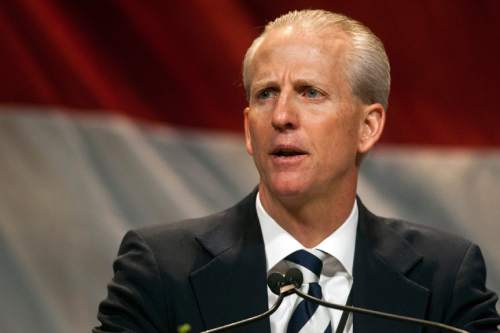This is an archived article that was published on sltrib.com in 2016, and information in the article may be outdated. It is provided only for personal research purposes and may not be reprinted.
Ten years ago, I made a campaign decision I wish I could undo. It was my first election and I was embroiled in a challenging race for the Utah State Senate. In the heat of the campaign, my consultants and the state party proposed mailing negative literature about my opponents. I approved it. I should have said no.
My opponents in that race were Bryson Garbett in the primary election and Trisha Beck in the general. One of the mailers gave a misleading and inaccurate impression that Trisha Beck was in favor of legalizing marijuana and cast her in an extreme negative light.
A decade later, this decision still troubles me. I have personally apologized to Trisha and Bryson for my decisions. Sometimes, in political campaigns, we act in ways that do not reflect what President Lincoln described as the better angels of our nature.
In light of my experience, I hope readers would permit me to offer a few words of advice. In doing so, I hope to avoid sounding self-righteous. We strive for the ideal. We all do our best, but I am very aware of how easy it is to fall short. Nonetheless, these are ideals I hope we would all pursue.
• In the heat of the campaign, stand for what you believe in. This includes political principles, but also should include basic moral values of right and wrong.
• Treat others, including your opponent, with respect.
• Earnestly debate and focus on the issues, but avoid personal attacks.
• Be honest. You should debate and expose the issues, but don't skew the truth or cast your opponents in a misleading light. Robert Louis Stevenson said, "To tell the truth, rightly understood, is not just to state the true facts, but to convey a true impression."
• Surround yourself with people who understand the difference between right and wrong and will act with fidelity to conscience.
• Campaign with intensity, but never viciously. You're in it to win, right? But be careful not to damage people's lives along the way.
• Remember that our actions do have a long-lasting influence on the people and community around us, in more ways than we can immediately discern.
• Demonstrate a gracious humility in both victory and defeat.
I share this, for what it's worth, so others might have the foresight to act more wisely than I did during my first campaign.
Local election processes are sacred. They have been bought with blood and maintained through great effort. Ask yourself: What impact will my attitude and decisions as a candidate have on the overall election atmosphere? Will my campaign decisions enhance or degrade the experience of citizens selecting wise, capable leaders?
Campaigns only last a few months, and no elected office is more than a temporary entrustment. During that time, however, we should remember that our day-to-day decisions make a lasting impact. We own our legacies. We are responsible for the influence of our time in the public arena.
Years from now, will we be comfortable with the decisions we made in pursuit of power? Will our families be proud of our decisions? Will we be proud when the next generation follows our example?
Ambitious ends won't justify less-honorable means. Decisions made in stress, anger or a desire for vengeance are usually the ones we regret most. If we jettison our basic values and integrity for political expediency, then we have probably failed in our journey through life.
This campaign season, let us all live up to the better angels of our nature.
Sen. Wayne Niederhauser is president of the Utah Senate.



